Nabhas, Nabhash: 38 definitions
Introduction:
Nabhas means something in Buddhism, Pali, Hinduism, Sanskrit, Jainism, Prakrit, the history of ancient India, Marathi, Hindi. If you want to know the exact meaning, history, etymology or English translation of this term then check out the descriptions on this page. Add your comment or reference to a book if you want to contribute to this summary article.
Nabhas has 34 English definitions available.
Languages of India and abroad
Sanskrit dictionary
[Deutsch Wörterbuch]
Source: Cologne Digital Sanskrit Dictionaries: Böhtlingk and Roth Grosses Petersburger WörterbuchNabha (नभ):—
1) m. a) = nabhas Himmelsraum, Luftraum [Śabdaratnāvalī] bei [Wilson’s Wörterbuch] In dem Citat jīvo nabhopamaḥ aus der Śruti beim Schol. zu [Kapila 1, 51] brauchen wir keinen Stamm nabha anzunehmen, da ein a, nach dem ein s abgefallen ist, auch sonst wohl mit einem nachfolgenden Vocale zu verschmelzen pflegt. — b) = nabhas der Monat Śrāvaṇa [Śabdaratnāvalī im Śabdakalpadruma] — c) m. Nomen proprium eines Sohnes des Manu Svārokiṣa [Harivaṃśa 419.] des 3ten Manu 424 (an beiden Stellen neben nabhasya, also ursprünglich wohl auch nur Monatsname). Nomen proprium eines der 7 Weisen im 6ten Manvantara [435.] Nomen proprium eines Unholdes, des Sohnes des Viprakitti von der Siṃhikā, [215.] [Viṣṇupurāṇa 148.] Nomen proprium eines Sohnes des Nala (Niṣadha) und Vaters des Puṇḍarika (vgl. nabhas
10) [Harivaṃśa 823. fg.] [Bhāgavatapurāṇa 9, 12, 1.] —
2) f. nabhā a) Spucknapf (scheint eine Verwechselung mit nabhas m. zu sein, da bei diesem Worte die von den Lexicographen gegebene Bedeutung Spucknapf bei [Wilson’s Wörterbuch] gerade fehlt). — b) Nomen proprium der Stadt des Sonnengottes [ŚABDĀRTHAK.] bei [Wilson’s Wörterbuch]
--- OR ---
Nābha (नाभ):—
1) am Ende eines adj. comp. = nābhi [Vopadeva’s Grammatik 6, 23.] a) Nabel: abja aus dessen Nabel eine Lotusblume sich erhebt, Beiname Viṣṇu’s [Bhāgavatapurāṇa 5, 1, 19.] aravinda desgl. [3, 22, 21.] kamala desgl. [4, 30, 25.] — b) Nabe des Rades: vajra, su (cakra) [Mahābhārata 1, 8196. 3, 178. 8, 3853. 10, 625. 16, 60.] mahā [Rāmāyaṇa 6, 87, 10.] — c) Mittelpunkt: su (cāpa) [Rāmāyaṇa 1, 33, 12.] śaṅkhaḥ svarṇanābhaḥ die Spitze der Muschel [Mahābhārata 5, 1542.] —
2) neben nābhya unter den Beinamen Śiva’s [Mahābhārata 12, 10364]; wohl so v. a. Mittelpunkt. —
3) m. Nomen proprium eines Sohnes Śruta’s und Vaters Sindhudvīpa’s (vgl. nābhāga) [Bhāgavatapurāṇa 9, 9, 16.] — Vgl. unnābha, ūrṇa, kaṃja, kāla, tuṅga, tri, dṛḍha, deva, dharma, padma, puṣkara, vajra, su, svarṇa, hiraṇya .
Source: Cologne Digital Sanskrit Dictionaries: Böhtlingk and Roth Grosses Petersburger WörterbuchNabhas (नभस्):—
--- OR ---
Nabhas (नभस्):—
4) nabhodhāraṇā [Oxforder Handschriften 237,a,5.] —
5) [Meghadūta 4.]
Source: Cologne Digital Sanskrit Dictionaries: Sanskrit-Wörterbuch in kürzerer FassungNabha (नभ):——
1) m. — a) *Himmelsraum , Luftraum. — b) ein best. Monat , = nabhas [Carakasaṃhitā 8,6.] — c) Nomen proprium — α) eines Sohnes des Manu Svāraciṣa und des 3ten Manu. — β) eines Ṛṣi im 6ten Manvantara. — γ) eines Unholds , Sohnes des Vipracitti. — δ) eines Sohnes des Nala. —
2) *f. ā — a) Spucknapf. — b) Nomen proprium der Stadt des Sonnengottes.
--- OR ---
Nābha (नाभ):——
1) am Ende eines adj. Comp. — a) Nabel. — b) Nabe des Rades. — c) Mittelpunct. —
2) Adj. Beiw. Śiva's. —
3) m. Nomen proprium eines Mannes.
Source: Cologne Digital Sanskrit Dictionaries: Sanskrit-Wörterbuch in kürzerer FassungNabhas (नभस्):——
1) n. — a) Nebel , Dunst , Gewölk. — b) Duft (des Soma). — c) Luftraum , Himmel. nabhastas vom H. herab. — d) Du. Himmel und Erde. — e) Aether (Als Element). — f) ein best. Monat in der Regenzeit. Nach den Lexicographen m. — g) *Lebensalter. — h) von unbekannter Bed. [Vājasaneyisaṃhitā 5,9.32.] —
2) m. — a) *Wolke. — b) *Regenzeit. — c) *Geruch oder *Nase. — d) *ein Faden aus dem Wurzelschoss des Lotus. — e) *Spucknapf. — f) Nomen proprium eines Fürsten.
Sanskrit, also spelled संस्कृतम् (saṃskṛtam), is an ancient language of India commonly seen as the grandmother of the Indo-European language family (even English!). Closely allied with Prakrit and Pali, Sanskrit is more exhaustive in both grammar and terms and has the most extensive collection of literature in the world, greatly surpassing its sister-languages Greek and Latin.
See also (Relevant definitions)
Starts with (+47): Nabhahketana, Nabhahkrantin, Nabhahpantha, Nabhahprana, Nabhahsad, Nabhahsamcarini, Nabhahsaras, Nabhahsarit, Nabhahshvasa, Nabhahsprish, Nabhahsprisha, Nabhahstha, Nabhahsthala, Nabhahsthali, Nabhakcyuta, Nabhasa, Nabhasadravya, Nabhasamgama, Nabhasangama, Nabhasayoga.
Ends with: Abhinabhas, Anabhas, Lokanabhas, Prannabhas, Urdhvanabhas, Ushnabhas.
Full-text (+84): Nabhashcakshus, Nabhashcara, Nabhashcamasa, Nabhasvat, Nabholaya, Nabhonadi, Nabhodvipa, Nabhomani, Nabhogaja, Nabhahprana, Nabhombupa, Nabhogati, Nabhastala, Nabhahsad, Nabhahsprish, Nabhasya, Nabhodhuma, Nabhoduha, Nabhorajas, Nabhahsthali.
Relevant text
Search found 22 books and stories containing Nabhas, Nabhash, Nabhaś; (plurals include: Nabhases, Nabhashes, Nabhaśs). You can also click to the full overview containing English textual excerpts. Below are direct links for the most relevant articles:
Shrimad Bhagavad-gita (by Narayana Gosvami)
Verse 1.19 < [Chapter 1 - Sainya-Darśana (Observing the Armies)]
Puranic encyclopaedia (by Vettam Mani)
The Agni Purana (by N. Gangadharan)
Chapter 180 - Vows observed on the fifth lunar day
Trishashti Shalaka Purusha Caritra (by Helen M. Johnson)
Part 29: Śreyāṃsa’s mokṣa (emancipation) < [Chapter I - Śreyāṃsanāthacaritra]
Part 4: Birth of Nami < [Chapter XI - Śrī Namināthacaritra]
Part 7: Birth of Kṛṣṇa < [Chapter V - Birth of Rāma, Kṛṣṇa, and Ariṣṭanemi]
Rig Veda (translation and commentary) (by H. H. Wilson)
The Shiva Purana (by J. L. Shastri)
Chapter 39 - Kings of the solar race (sūryavaṃśa) < [Section 5 - Umā-Saṃhitā]
Related products
